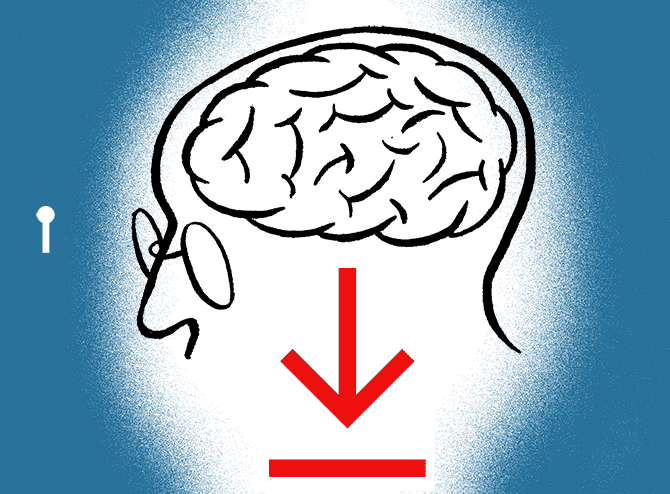'AI will be bigger than the advent of the Internet or the harnessing of electricity.'
'India must embrace it with all its might,' says NITI Aayog CEO Amitabh Kant.
Illustration: Dominic Xavier/Rediff.com

Three factors have combined to bring Artificial Intelligence (AI) into widespread application across the global economy -- availability of massively parallel computational resources; development of better algorithms to coordinate the activity of computers engaged in AI; and the availability of big data associated with the Internet.
This combination of factors has, for example, led to error rates of image labelling falling from 28.5 per cent to a mere 2.5 per cent since 2010.
A PwC report estimates that AI will contribute $15.7 trillion to the world economy by 2030 -- more than the combined current output of China and India.
An Accenture report, ReWire for Growth, forecasts that AI will boost India's annual growth rate by 1.3 percentage points by 2035.
This amounts to an addition of $957 billion, or 15 per cent of current gross value added (a close approximation of GDP), to India's economy in 2035, compared with a scenario without AI.
India is uniquely poised to be a leader in AI for developing countries, given our strength in technology, favourable demographics and structural advantages in availability of advanced data (JAM trinity, UPI).
India's data diversity is a big draw for global AI implementers, as data is the fuel that powers current-generation AI algorithms utilising deep learning.
AI-based applications are especially useful in government, where scale and quality needs to be addressed simultaneously.
India ranked third among G20 countries in 2016 measured by the number of AI start-ups, which have increased since 2011 at a CAGR of 86 per cent, higher than the global average.
However, the sector is primarily dominated by American firms like Accenture, Microsoft and Adobe, which have their innovation centres here.
It is important to encourage innovation and entrepreneurship in AI. Otherwise, local solutions and local entrepreneurs will be unable to face the increasing entry barriers.
Since deep neural networks are universal modellers, any AI application is only as good as the data it was trained on.
Increasingly, data has consolidated in the hands of ever fewer firms. Facebook has 2 billion monthly active users. Google processes 90 per cent of Web searches in many countries.
However, we have a lot of unique structured data due to our 'mobile first' usage and innovations such as UPI and Aadhaar.
We have unique needs also.
We should explore new approaches for privacy, preserving machine learning such as encrypted multi-party computation.
Openmined.org is one such open-source project which is building the necessary tools to leverage structured and anonymised data for training purposes.
This way, private data would remain entirely private, but machine learning algorithms could learn from them.
AI is often thought of a 'far future' technology -- especially by governments -- that is best left to research wings of governments who often make breakthroughs but also large numbers of indicative products not tailored to local communities or users.
This must change.
Since it can be reasonably argued that the addition of quality training data plays a greater role in the success of an AI application, IP laws around AI will have to be fine-tuned to reflect this.
Developing countries must embrace AI, not necessarily in sectors such as driverless cars, but in health, education, agriculture and other sectors where developing countries need to make quantum leaps.
NITI is undertaking several proof-of-concept projects.
First, it is partnering with ISRO and IBM to implement AI solutions to improve crop productivity and soil health on farms by using data from remote sensing satellite images and other data available with government.
This will be first implemented in 25 aspirational districts to assess impact and accuracy. The insights generated will be extended to farmers for taking action for the crop.
This will also be integrated with e-NAM mandis for better price realisation for farmers.
Second, NITI is working on creating a regional language AI-natural language processing library for entrepreneurs and developers.
The prime minister has called for 'Ek Bharat Shrestha Bharat'. Preserving the diversity of our many languages, while fostering more communication between citizens, is a goal of the government.
NITI has begun exploring the inception of a national language processing platform that can provide AI applications (current and future) with APIs/open source libraries to do natural language processing tasks like entity extraction and intent recognition on indigenous languages.
This will enable AI developers to reach the entire smartphone subscriber base, and not just the English-speaking base, without building their own models for their languages.
Third, NITI is partnering with several medical institutions to build a 'biobank' of images -- radiological and pathological, at the outset.
This biobank will be a collection of images from CT scans, MRIs, ultrasounds and x-rays, which will lend itself to training the AI model for early detection of anomalies -- expertise that is available only with super-specialised hospitals.
This capability to auto-analyse an image will lend diagnostic ability at the primamry health centre level, where India is severely underserved and the quality of medical diagnosis is inadequate.
This biobank can build up capabilities for analysing and predicting disease hotspots in India, helping the government to plan specific interventions at the regional level for improving health and nutrition outcomes.
Fourth, NITI has already designed architecture for building interoperable electronic medical records using blockchain which is secure, ensures patient privacy and is accessible to patients on their mobile phones.
An inter-operable EMR on blockchain can trigger a multiplier effect on innovations in health -- it will increase health and life insurance penetration, reduce insurance fraud to a minimum and eliminate government subsidy leakage.
The EMR data, stored in anonymised and encrypted form, can be used to undertake analyses using AI to predict early symptoms of epidemic outbreaks, extent of anti-microbial resistance (region-wise) and disease heat mapping.
This analysis will be useful for specific policy interventions and building requisite healthcare infrastructure in India's states and regions.
To keep the data on a blockchain private, zero knowledge proof-based architectures are being explored.
Fifth, we are exploring the use of AI to assist the judiciary in reducing the backlog of court cases.
NITI is working on an AI model to analyse existing court judgements and provide insights for judges in current cases.
India has more than 30 million cases pending in courts, many of them for over five years. Our Ease of Doing Business ranking is severely impacted by our score in enforcing contracts.
AI is a fundamental innovation. It will be bigger than the advent of the Internet or the harnessing of electricity.
In the years to come it will transform every single industry and sector.
India must embrace it with all its might.
Amitabh Kant is CEO, NITI Aayog. These views are personal.












 © 2025
© 2025